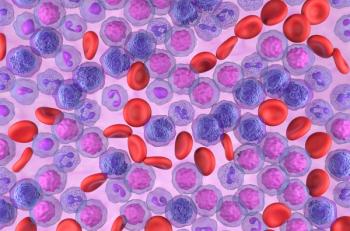
Data from the phase 3 KEYNOTE-689 trial support the approval of the pembrolizumab-based regimen in this locally advanced HNSCC population.

Your AI-Trained Oncology Knowledge Connection!


Russ Conroy is an Associate Editor for CancerNetwork. He grew up in Hillsborough, New Jersey, and graduated from Rutgers University-New Brunswick in 2022.
On the weekends, he likes to unwind by playing video games with friends, tailgating at Rutgers football games with his family, or building his music collection with a visit to Princeton Record Exchange.

Data from the phase 3 KEYNOTE-689 trial support the approval of the pembrolizumab-based regimen in this locally advanced HNSCC population.

Data from the phase 3 ENVISION trial support the FDA approval of the mitomycin solution for patients with recurrent, low-grade, intermediate-risk NMIBC.

The safety profile of iopofosine I 131 in the phase 1b CLOVER-2 trial appears consistent with prior reports of the agent.

Phase 2 data may support nivolumab plus low-dose ipilimumab as a promising option in patients with microsatellite instability–high gastric cancer.

The FDA has set a Prescription Drug User Fee Act date of October 7, 2025, for its decision on approving the lurbinectedin combination in this SCLC population.

Results from the PERSEUS trial support daratumumab plus bortezomib, lenalidomide, and dexamethasone as a standard of care in transplant-eligible NDMM.

Subgroup data from the CEPHEUS trial reinforce daratumumab plus bortezomib, lenalidomide, and dexamethasone as a standard of care in this population.

Most patients who received COCOON dermatologic management reported mild or no dermatologic symptoms following treatment with amivantamab/lazertinib.

Data from DESTINY-Breast09 may support trastuzumab deruxtecan plus pertuzumab as a frontline standard of care in HER2-positive advanced breast cancer.

Data from the NeoSTAR trial showed no new safety signals with sacituzumab govitecan plus pembrolizumab for early-stage triple-negative breast cancer.

Findings support the established safety profile of lisocabtagene maraleucel across hematologic oncology indications.

Emergent alteration patterns were similarly diverse across treatment arms in the phase 3 CodeBreaK 300 study.

Phase 3 data may support FOLFIRINOX as a standard of care in fit patients with locally advanced pancreatic cancer.

Experts highlight research at the 2025 ASCO Annual Meeting that may move the needle in gynecologic cancers, hematologic malignancies, and other fields.
!["[I]nduction [etoposide and carboplatin] followed by a combination of camrelizumab, apatinib and [etoposide and carboplatin], and subsequent maintenance camrelizumab plus apatinib, showed a tolerable safety and promising antitumor activity, suggesting its potential as a first-line therapy option for patients with ES-SCLC," according to the study authors.](https://cdn.sanity.io/images/0vv8moc6/cancernetwork/b1587a6320f32b9e3dab51f09b50bb01961a2d68-1200x946.jpg?w=350&fit=crop&auto=format)
The safety profile of camrelizumab plus apatinib and chemotherapy in a phase 1 study aligns with prior reports of each agent.
!["Given the superior efficacy of [chemoimmunotherapy], it holds promise as a first-line neoadjuvant therapy for MIBC, providing greater benefits to patients," according to the study authors.](https://cdn.sanity.io/images/0vv8moc6/cancernetwork/481e483e3d7f2b45988df26b6d358730cc4c7acb-1200x800.jpg?w=350&fit=crop&auto=format)
Real-world data may support chemotherapy plus immune checkpoint blockade as a promising frontline neoadjuvant therapy for muscle-invasive bladder cancer.

The European Commission is expected to approve the belantamab mafodotin combinations for this multiple myeloma population in the third quarter of 2025.

From breast cancer to head and neck tumors, the 2025 ASCO Annual Meeting may feature a wide range of practice-changing data across cancer care.

Data from the INCITE-ES study show 100% technical success with pulsed electric field energy delivery before surgical resection.

The FDA’s ODAC convened to discuss the potentially inconsistent treatment effects of glofitamab between regional subgroups in the phase 3 STARGLO trial.

Findings from the CheckMate 77T study support the approval of this nivolumab-based regimen in the European Union.

Data from the DREAMM-7 and DREAMM-8 trials support the approval of belantamab mafodotin for patients with relapsed/refractory multiple myeloma in Japan.

Treatment with disitamab vedotin and toripalimab improves survival regardless of cisplatin eligibility or HER2 expression level in the phase 3 RC48-C016 trial.

Data from the POD1UM-303/InterAACT2 trial support the approval of retifanlimab/chemotherapy for patients with squamous cell carcinoma of the anal canal.

Data from the KEYNOTE-B96 trial also show a significant overall survival improvement with pembrolizumab-based treatment in PD-L1–positive disease.

Data from the phase 2 LUMINOSITY study support the FDA approval of telisotuzumab vedotin in this non–small cell lung cancer population.

An independent data safety monitoring board determines that the phase 2b SURVIVE trial in newly diagnosed glioblastoma may continue without modification.
!["Policy changes aimed at supporting and more broadly enabling breastfeeding, addressing structural barriers, and promoting a culture shift could reduce overall incidence and racial disparities in TNBC incidence in the [US]," according to the study authors.](https://cdn.sanity.io/images/0vv8moc6/cancernetwork/c33b85fa4b3edf9bdd0a6d37d81eee57f71a7348-1200x960.jpg?w=350&fit=crop&auto=format)
Policy changes supporting breastfeeding may address structural barriers and lower overall incidence and racial disparities surrounding TNBC in the US.

Phase 2 data support the potential of revumenib to advance the standard of care for patients with relapsed/refractory NPM1-mutated acute myeloid leukemia.
!["[G]iven the improvements in compliance and tolerability of the de-escalated regimen in older patients, with preserved early cancer outcomes, this reduced-dose regimen could be considered a new treatment option for [patients who are] frailer [and] not fit for standard-dose chemoradiotherapy," according to the study authors.](https://cdn.sanity.io/images/0vv8moc6/cancernetwork/8987adec8367653dbaf8fc0f82c7dbfcb914281e-500x404.jpg?w=350&fit=crop&auto=format)
Phase 2 data indicate that reduced-dose chemoradiotherapy may be tolerable among patients with early-stage anal cancer.